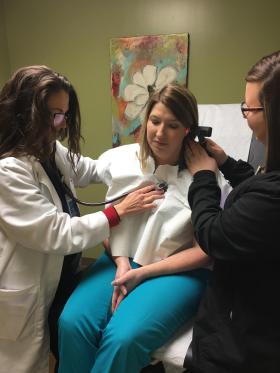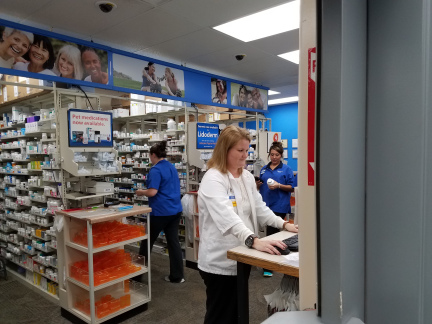Headlines
Oxford Stories: Overuse Of Antibiotics Worries Academic And Professional Pharmacists

Thad Cochran Research Center at the University of Mississippi. It, along with Faser Hall, conducts the majority of pharmaceutical education and research on the University of Mississippi’s campus. Its construction is merged with Faser Hall. By Skyler Crane.
Whether it’s for sniffles, sneezes, cough, or cold, everyone goes to the doctor at some point in their lives, and many are treated with antibiotics. However, there is a growing concern among health professionals and scientists about antibiotic resistance.
According to the World Health Organization, “Antibiotic resistance is one of the biggest threats to global health, food security, and development today.”
Antibiotics are medications that combat bacterial infections. Medical News Today states there are many antibiotics, but they all work in one of two ways: Bactericidal antibiotics kill bacteria, and bacteriostatic antibiotics stop bacteria from multiplying. Antibiotics are incapable of treating viral diseases, though they are able to treat bacteria, fungi, and parasites.
The concern for antibiotic usage surfaces in how antibiotics have the potential to make bacteria stronger. Professionals and academics in the pharmaceutical and general health fields have expressed worry over this growing over-reliance on antibiotics.

Marc Slattery. Office located in Faser Hall 411. By Skyler Crane.
Marc Slattery is a member of the University of Mississippi’s Department of Biosciences as a professor of pharmacognosy. From Jamaica, Slattery was exposed to marine life and their biological process since his birth in 1959, where he became interested in aquatic life.
He has received multiple degrees in biology and obtained his Ph.D. in biology at the University of Alabama at Birmingham in 1994. Before settling into his position at the University of Mississippi, Slattery taught scuba-diving lessons and worked at various biology technician positions.
“Bugs are going to adapt,” he said. “It will only get worse with time.”
Slattery references the effects of how antibiotics work. When an antibiotic is introduced to a person’s body, it will kill bacteria. Naturally, the first bacteria to die are the weakest. This means that the stronger strains of bacteria survive longer and are allowed to multiply more frequently now that their competition has been lessened.
Nurse Practitioner Dana Grant affirms this development. Grant is a nurse practitioner at Calhoun County Medical Clinic in Tupelo. Before she became a nurse practitioner, she worked as an emergency room nurse for 10 years.
In 2006, she received a bachelor’s degree in nursing from West Chester University in West Chester, Pennsylvania before she received a master’s degree in nursing from Walden University in Minneapolis, Minnesota in 2015.

NP-C Dana Grant checking her patient. By Skyler Crane.
“We’ve overused antibiotics,” she said. “It’s made worse if a patient stops taking their prescription.”
The problem is complicated and rendered more dangerous when people do not follow their prescribed antibiotic regimes to completion and stop taking the drug before the stronger bacteria is eradicated. If someone stops taking their antibiotics before they are instructed, the stronger bacterial strains may live on and pass on the genes that make them immune to that antibiotic to future generations.
This is the problem with antibiotics. They hold the potential to accelerate bacterial mutation, and thereby the potential to make bacteria more resistant to antibiotic treatments.
“We’re facing a crisis when fighting bacterial infection,” Grant said.
Pharmacist Jessica Mooney echoes this statement. She is a 2002 pharmacy graduate of the University of Mississippi who attended the University of Mississippi Medical Center in Jackson. She was employed by Walmart in New Albany upon her degree’s completion.
“There are so many different [bacterial] bugs,” she said. “Super bugs are, and have been, a developing issue.”
Even NP-C Grant commented on this issue.

Pharmacist Jessica Mooney overseeing prescription information. By Skyler Crane.
“Bacteria are changing faster than we can make antibiotics,” she said. “It’s quite scary.”
This does not mean that antibiotics are evil, however.
“Antibiotics have a purpose,” Slattery said, “but the way we use them needs to be more selective and thoughtful.”
Another issue is the amount of time it takes for new antibiotics to be produced.
“It can take up to 20 years for new antibiotics to be developed,” he said.
This is caused by increasingly stricter regulations set by the Food and Drug Administration. On the FDA’s website, an extensive table is dedicated to informing people what steps need to be taken before a drug, including antibiotics, can be approved for commercial sale.
When compared to bacteria that can replicate thousands of generations in a day, this development process is extremely sluggish.
“I don’t think we’ll reach a point where we get rid of the FDA,” said Doctor Slattery. “What’s going to be the next best drug?”
Pharmacist Mooney believes that with proper consulting of patients, appropriate usage of antibiotics can be attained to prevent bacteria’s increasing resistance to antibiotics.
“You have to worry about resistance,” she said. “We need to consult with our patients so they understand why this issue is so important.”
With proper foresight and care, the usage of antibiotics can be regulated and maintained within a safe margin. As the situation with antibiotics develops, the relationship between a person and their medical professionals will grow more important.
By Skyler Crane. Read more stories like this on Oxford Stories.
For questions or comments, email hottytoddynews@gmail.com.





























